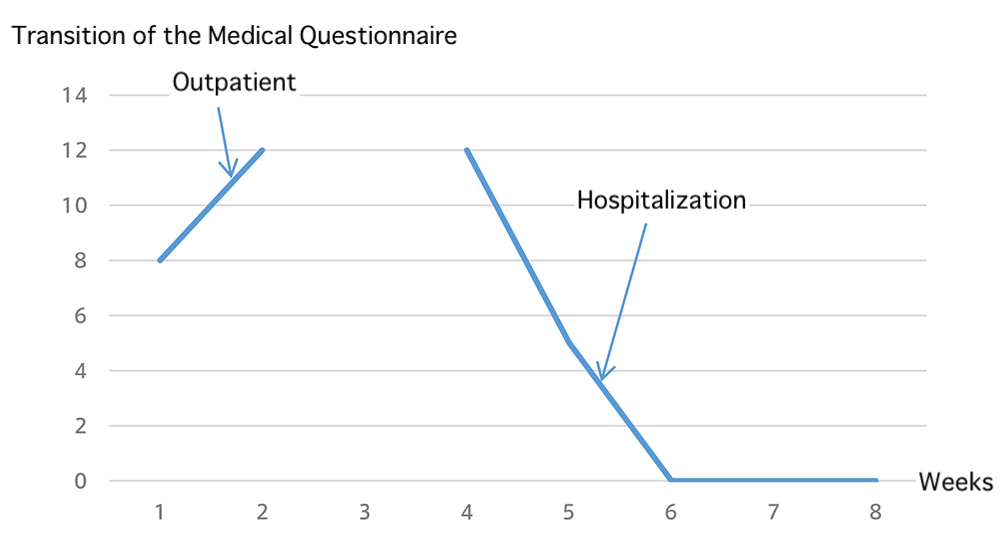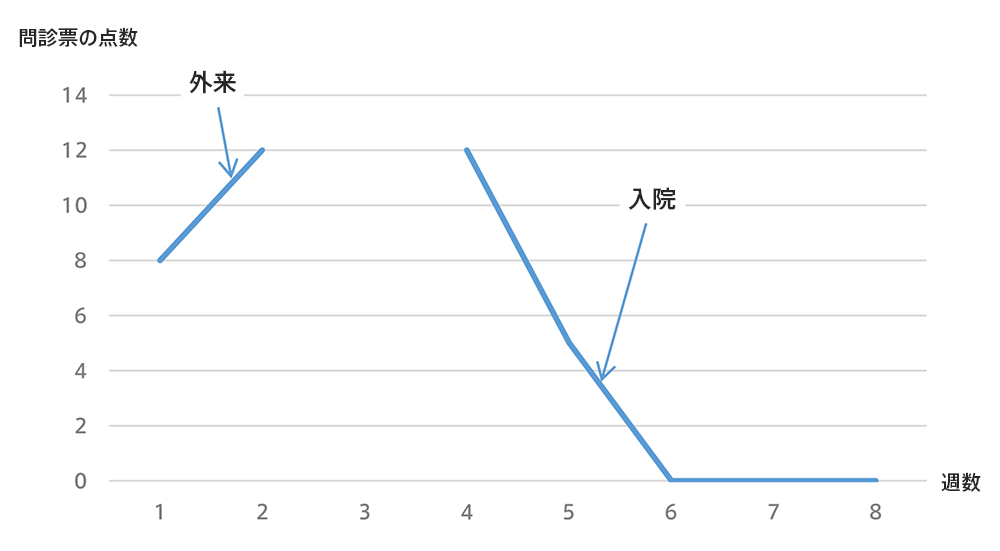高校2年生の頃から、朝の立ちくらみ、頭痛、不眠の症状が出てきて、複数の小児科を受診した後、松井病院に入院し頸の電気治療で短期間に症状が劇的に改善
From the time he was in his second year of high school, he started to suffer from morning dizziness, headaches, and insomnia. After visiting several pediatricians, he was admitted to Matsui Hospital, where he underwent electrical neck treatment, and his symptoms improved dramatically in a short period of time.
Followed by English translation
症例 NO.084 16歳 男性
母親と本人の体験記
我が子がはじめて起立性調節障害と診断されたのは高校1年生の9月。
高校生活が始まってからは、新型コロナウイルス感染症で7月に1週間欠席したのみで、それ以外は元気に登校していました。
朝の立ちくらみと頭痛でOD (起立性調節障害) だなんて。
成長期にみられる症状で、何度かTVやネットで見聞きしたことはありましたが、まさか・・・
何だか突然の事で信じられませんでした。
あまり気にしないようにしようと、この時は深く考えずに色々と調べたりもせずに、かかりつけの小児科の先生の治療方針に従っていました。
吐き気や頭痛などで2学期は5回の欠席がありました。
1月から胃痛、立ちくらみ、体に力が入らないという日があり小児科で漢方薬 (半夏厚朴湯)を処方されました。
2月、3月もOD症状が改善されずにメトリジンD錠が追加されました。
3学期は12回の欠席でしたが、なんとか進級できました。
3月の下旬から、のどの痛み、夜の寝つきが悪くなる症状も増えて、少しうつ状態になっていました。
春休みには、朝はお昼頃にならないと起きられなくなっていました。
処方薬がリズミック錠と小建中湯に変りました。
高校2年生の4月、始業式は何とか出席できましたが5回の欠席と2回の遅刻。
5月は6回の欠席と12回の遅刻。
6月は5回の欠席と12回の遅刻。
7月は3回の欠席と11回の遅刻。
5月中旬、小児科の先生が大きな医療センターの児童精神科に診療予約を取ってくれたのですが、予約日は9月中旬とだいぶ先でした。
この日まで待つなんて、どうなるのだろう。
先の見えない状況に、不安で押しつぶされそうでした。
6月には小児科で処方された薬は飲んでいても何も変わらなかったので、飲むのをやめて開業医の精神科を受診しました。
睡眠障害と診断されてラメルテオン錠を処方されました。
朝日を浴びて、朝は起きようという気持ちをしっかり持ってくださいと言われました。
ラメルテオンで夜は眠れるようになりましたが、睡眠時間は午前0時頃に寝て、朝は11時~12時に起きるという感じでした。
7時~8時頃に目を覚ますことはできるのですが、立ちくらみと、体に力が入らないので起き上がる事ができず、お昼頃までベッドにいる日々でした。
体重が4月から2キロほど減少していました。
朝は起きられないから、1日の食事回数は昼と夜の2回で、喉の痛みや胃の不快感で食欲もありませんでした。
小児科の薬を飲んでいてもよくならず、 症状はどんどん酷くなるばかりで親として何とか以前の生活が送れるようにと、5月に入ってからは色んな情報を集めていました。
6月中旬、やっと松井病院のことをネットで知ることができました。
県内にOD専門の病院があるなんて聞いたことがありませんでしたし、どうして今まで検索しても出てこなかったのか。もう受診するしかない。
7月に入ってすぐ、電話で診察の予約を取ることができました。
初めての診察時に、どの程度の症状かを把握するために問診表でのチェックがありました。
該当したチェック項目が12個程度あり、原先生が「症状の程度は中等症のようですね。 でも、治りますよ。」と言ってくださいました。 その言葉を信じて、当面は、週に2回の頻度で電気治療を始めることにしました。
しかし、1学期の間、出席日数不足の教科や定期テストを受けていなかったこともあり、単位取得のため、夏休みに入って追試の課題の提出や補講授業の出席を求められ、体に無理をしていました。学校への対応ができなくなってきて、2回目の診察時には問診表のチェック項目が増えてしまいました。
このような状況になると、とにかく今は治療に専念した方がいいと考えて、原先生に入院治療した方が少しでも良くなる見込みがあるのならば入院したいと相談しました。
こちらの事情を説明して、先生も「入院した方がいいでしょう。通院の3倍は回復が違いますよ。」と、7月29日に入院となりました。
入院して5日目、信じられない言葉が子供から聞けました。
『8時起き余裕』
今まで早くても11時頃まで起き上がれなかったのに!!
頭痛、吐き気、立ちくらみの症状もなくなり、夜の寝つきも入院前より良くなり、朝ごはんも食べられている。
『何か急に良くなった』
本当に良かった!!
こんなに早く良くなるとは思ってもいなかったので、嬉しい気持ちと驚き、そして何より、この治療方法を見つけてくださった松井病院の先生方に感謝の気持ちでいっぱいになりました。 本当にありがとうございます。
入院治療は、初めの2週間は点滴が毎日2時間程度ありました。
電気治療は午前と午後の1日2回 (日曜、祝日は1日1回) していました。首の筋肉の異常からくる自律神経失調の症状との判断で、1回20分程度、首の筋肉をほぐす低周波治療を繰り返しました。
OD症状に対する服薬はありませんでした。
入院してから問診表のチェック項目が1週間で5個、2週間で0個になりました。
原先生も「良くなりすぎですね。 夏休みだし、もうしばらく入院して様子を見ていきましょう。」と笑顔でおっしゃってくださいました。
体調が回復してからも約2週間は入院していて、その後の経過は順調です。
初めての経験で、退院してから体調が崩れたらと不安に思うところもありますので、しばらくは電気治療に通院しようと考えています。
去年の9月から悪戦苦闘の日々でしたが、松井病院、そして原先生にご縁ができたことは非常に幸運でした。子供の通っている高校の養護教諭の先生に、もしも同じ症状で悩んでいる生徒さんがいたら、ぜひ松井病院を受診するようにお勧めしてくださいとお話ししようと思います。
また、友人にもこの体験を話して、 電気治療でよくなるということを広めていきたいです。
(2024年8月記)
患者本人の体験記
OD(起立性調節障害)。頭痛、吐き気、倦怠感、胃痛、目眩、立ちくらみ…などなど、様々な症状に見舞われる成長期にみられる病気。私が初めてそう診断されたのは、去年の9月。
その頃はまだ頭痛や立ちくらみ程度でしたが、年が移り変わる頃には上記の症状全てを毎日発症するという状況になっていました。そうなってからというもの複数の病院を受診し、たくさんの種類のお薬を処方されましたが、一向に症状が改善する気配がありませんでした。そのお薬の中には、とても味がよろしくないものもありました。「良薬は口に苦し」と言いますが、治らなかったのですから私にとっては良薬ではないのに口に苦いとはこれ如何に。
それはさておき、転機が訪れたのは今年の6月。母がインターネットでOD専門の病院を見つけてくれました。その名も松井病院・・・そう、ここです。7月に診察の予約を取り、いざ診察。
原先生によると「首の電気治療をすれば治る」とのこと。首は全くの意識外で正直半信半疑でしたが、同じような症状の人はみんな治っていると言われてはもう信じる他ありません。という訳で、とりあえず週2回の頻度で治療を受けることにしました。
しかしちょうどその時期から学校が忙しくなり、体にこれまで以上に負担がかかるようになりました。夏休みになっても忙しいのは変わらず、週2回では治るまで時間がかかりすぎます。実は学校を休みがちになっていて出席数が怪しく、悠長にはしていられません。症状もそこそこ重いしいっそ夏休みの間は入院して治療に専念しよう、そうしよう。
そう思って先生に相談してみたところ、そうした方がいい、とのことなので入院することになりました。治療は1日2回(日、祝は1回)。今までとは比べ物にならない頻度です。
そこからは、一瞬でした。何と入院して1週間余りが経った頃には、あれだけ私を悩ませていた症状がきれいさっぱり消えていたのです。さすがに早すぎるようで先生も驚いていましたが、確かに私のODは治ったのです。
この治療に出会えてよかったと思っています。本当にありがとうございました。
(2024年8月記)
症状経過
From the time he was in his second year of high school, he started to suffer from morning dizziness, headaches, and insomnia. After visiting several pediatricians, he was admitted to Matsui Hospital, where he underwent electrical neck treatment, and his symptoms improved dramatically in a short period of time.
Case No. 084: 16-year-old male
A mother's and her child's experience
My son was first diagnosed with Orthostatic Dysregulation in September of his first year of high school.
Since the start of high school, he only missed one week in July due to COVID-19, but otherwise went to school fine.
I never thought that morning dizziness and headaches were OD (Orthostatic Dysregulation).
It's a symptom seen during the growth period, and I'd seen and heard about it on TV and the internet several times, but I never thought...
It was so sudden that I couldn't believe it.
Trying not to worry too much about it, I didn't think too deeply about it or do any research at the time, and just followed the treatment plan from my pediatrician.
He missed school five times in the second term due to nausea and headaches.
From January, he had days when he had stomach pains, dizziness, and weakness when standing up, so the pediatrician prescribed a Chinese herbal medicine (Hange Kouboku Tang).
In February and March, the OD symptoms did not improve, so Metolidin D tablets were added.
He missed school 12 times in the third term, but he managed to move on to the next grade.
From the end of March, he started to have symptoms such as a sore throat and trouble falling asleep at night, and he became a little depressed.
During spring break, he was unable to wake up until around noon in the morning.
His prescription medication was changed to Rhythmic (Amezinium) tablets and Chinese herbal medicine (Shokenchuto).
In April of his second year of high school, he managed to attend the opening ceremony but was absent five times and late twice.
In May he was absent six times and late 12 times.
In June he was absent five times and late 12 times.
In July he was absent three times and late 11 times.
In mid-May, our pediatrician made an appointment for him at the child psychiatry department of a large medical center, but the appointment was not until mid-September, which was still a long way off.
What would happen if we had to wait until this late?
The uncertainty of the situation was overwhelming, and I felt overwhelmed by anxiety.
In June, he stopped taking the medication prescribed by the pediatrician as it was not helping his condition and went to see a psychiatrist at his private practice.
He was diagnosed with a sleep disorder and prescribed Ramelteon tablets.
He was told to expose himself to the morning sunlight and to have a strong desire to wake up in the morning.
Ramelteon helped him to sleep at night, but he would go to bed around midnight and wake up between 11 and 12 in the morning.
He was able to wake up around 7 or 8, but he was unable to get up because he felt dizzy and had no strength in his body, so he spent most of his time in bed until around noon.
He had lost about 2 kg since April.
Because he was unable to wake up in the morning, he was only eating twice a day, at lunchtime and in the evening, and he had no appetite due to an uncomfortable feeling in his throat and stomach.
Even though he was taking pediatric medicine, his condition did not improve and he was only getting worse, so as a parent I started to gather information from May onwards, hoping to somehow help him return to his normal life.
In mid-June, I finally found out about Matsui Hospital on the internet.
I had never heard of a hospital in the prefecture that specialized in Orthostatic Dysregulation, and I wonder why it hadn't come up in my searches until now. I had no choice but to go and see a doctor.
As soon as July began, I was able to make an appointment over the phone.
During my first visit, He was asked to fill out a questionnaire to determine the severity of my symptoms.
He checked off about 12 items, and Dr. Hara told my son, "It looks like your symptoms are moderate. But you will get better." He believed the words and decided to start electrical treatment at the outpatient clinic twice a week for the time being.
However, during the first semester, he had missed classes and regular tests, and in order to earn credits, he was asked to submit supplementary exam assignments and attend supplementary classes during the summer vacation, which put a strain on his body. He was no longer able to cope with school, and at the second outpatient visit, the number of items to be checked on the medical questionnaire increased.
In this situation, I thought it would be best to focus on treatment at all costs, so I consulted with Dr. Hara about hospitalizing my son if there was any chance that he would improve if he received inpatient treatment.
After explaining our situation, the doctor said, "It would be better for your son to be hospitalized. He will recover three times faster than if he were an outpatient." So he was admitted to the hospital on July 29th.
On the fifth day of his hospitalization, I heard some unbelievable words from my son.
"I can easily get up at 8 o'clock."
Until now, he couldn't get up until around 11 o'clock at the earliest!!
His headaches, nausea, and dizziness have disappeared, he is sleeping better at night than before he was hospitalized, and he is even eating breakfast.
"Something has suddenly gotten better."
I'm so glad!!
I never expected to get better so quickly, so I was happy and surprised, and most of all, I was filled with gratitude to the doctors at Matsui Hospital who found this treatment method. Thank you so much.
During the first two weeks of his hospitalization, he received intravenous drip infusions for about two hours every day.
He received electrical treatment twice a day, in the morning and afternoon (once a day on Sundays and holidays). It was determined that his symptoms were due to autonomic nervous system imbalance caused by an abnormality in the neck muscles, and low-frequency treatment was repeated for about 20 minutes at a time to loosen the neck muscles.
He did not take any medication for his OD symptoms.
After being admitted to the hospital, the number of check items on the medical questionnaire went down to 5 in one week, and 0 in two weeks.
Dr. Hara said with a smile, "He has improved too much. It's summer vacation, so let's keep him in the hospital for a while longer and see how he does.
He remained in the hospital for about two weeks after his condition improved, and he has been progressing well since then.
This was a new experience for our son, and we are a little worried that his condition may worsen after he is released from the hospital, so we are thinking of continuing to receive electrical therapy for a while.
It has been a struggle since September of last year, but I was very fortunate to have had the opportunity to come into contact with Matsui Hospital and Dr. Hara. I will be telling the school nurse at my child's high school that if there are any students suffering from the same symptoms, I would like to encourage them to visit Matsui Hospital.
I would also like to share my experience with my friends and spread the word that electrical treatment can help.
(Written in August 2024)
A patient's personal experience
OD (Orthostatic Dysregulation). Headache, nausea, fatigue, stomach pain, dizziness, lightheadedness, etc. It is a disease seen in the growth period and causes various symptoms. I was first diagnosed with it last September.
At that time, I only had headaches and dizziness, but as the years went by, I was experiencing all of the above symptoms every day. Since then, I have visited several hospitals and been prescribed many different kinds of medicine, but there was no sign of improvement in my symptoms. Some of the medicines tasted very bad. They say that good medicine tastes bitter, but since it didn't cure me, why would it taste bitter?
Anyway, a turning point came in June of this year. My mother found a hospital on the internet that specializes in OD
. Its name was Matsui Hospital...yes, this is it. I made an appointment in July, and when I went for the checkup, Dr. Hara said, "You can get better with electrical treatment on your neck." To be honest, I was skeptical because my neck was completely unconscious, but when he told me that everyone with similar symptoms had been cured, I had no choice but to believe him. So, I decided to get treatment twice a week for the time being.
However, right around that time, things got busy at school, and my body started to take a lot more strain than it had before. Even during summer vacation, I was still busy, and it would take too long to get better with just two treatments a week. The truth is, I was often absent from school, so my attendance was questionable, and I couldn't afford to take it easy. My symptoms were pretty severe, so I decided to just stay hospitalized during summer vacation and focus on treatment.
I talked to my doctor about this, and he said it would be best, so I decided to stay hospitalized. I'm being treated twice a day (once on Sundays and holidays). This is a frequency that's incomparable to what I had been doing before.
From there, it all happened in a flash. Just over a week after I was hospitalized, the symptoms that had been bothering me so much had completely disappeared. The doctor was surprised, as it seemed so quick, but my Orthostatic Dysregulation was definitely cured.
I'm glad I found this treatment. Thank you so much.
(Written in August 2024)
Course of symptoms

